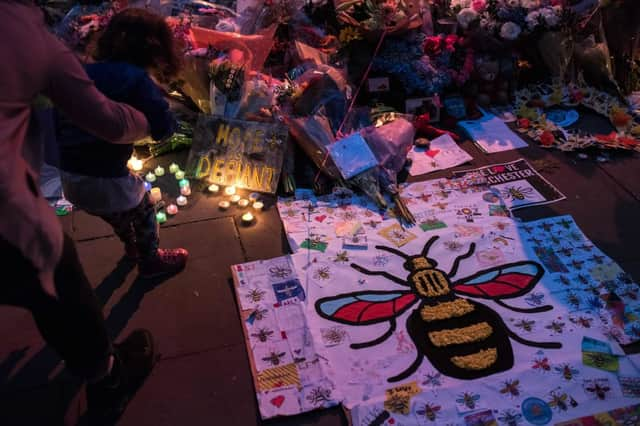Manchester Arena suicide bomber inquest details released six years after South Shields teens killed


Manchester Arena suicide bomber Salman Abedi died from blast injuries and took 22 innocent people with him, an inquest has concluded.
Sir John Saunders, chairman of the public inquiry into the terror attack, acting as a coroner, released details of his ruling on Wednesday.
Advertisement
Hide AdAdvertisement
Hide AdHe was legally obliged to hold an inquest because Abedi had a sudden and violent death, despite his role in the attack being revealed during the long-running public inquiry and the police investigation and prosecution of his brother Hashem, who helped plot the attack.
Tragically, South Shields teenagers, Chloe Rutherford and Liam Curry, then 17 and 19 respectively, were killed in the May 2017 terror attack.
After a documentary inquest rather than a public hearing in a coroner’s court, Sir John concluded Abedi, 22, died from “suicide while undertaking a terror attack that murdered 22 innocent victims and injured many others”.
The medical cause of death was blast injuries.
Recording the circumstances of how Abedi died, Sir John said: “The deceased died at 10.31pm on May 22 2017 in the City Room of the Manchester Arena in the Victoria Exchange Complex in Manchester.
Advertisement
Hide AdAdvertisement
Hide Ad“The deceased died near to the entrance doors to the Manchester Arena, when he detonated an explosive device that he had made with his brother and carried into the City Room in a backpack as part of a planned terror attack.
“In detonating the device the deceased murdered 22 innocent victims and injured many others.”
Surrounded by a throng of elated youngsters leaving at the end of an Ariana Grande show, Abedi exploded his shrapnel-packed, home-made rucksack bomb, sending out thousands of nuts and bolts, shredding everything in their path.
Following the blast, four body bags of Abedi’s remains were taken by private ambulance with a police escort from Manchester Arena to Royal Liverpool Hospital, where a post-mortem examination was held.
Advertisement
Hide AdAdvertisement
Hide AdDocuments released to the media showed Abedi was identified after DNA from tissue taken post-mortem matched with DNA held by the Home Office following his arrest by police for shoplifting in 2012.
There was no evidence of drugs or alcohol in his body and Abedi was not intoxicated at his time of death, the inquest was told.
Home Office pathologist, Jonathan Medcalf, concluded the blast injuries to Abedi caused his death and the pattern of injuries were consistent with the bomb being carried on his back when it exploded.
GP records showed Abedi had a history of asthma and acne.
He had last attended his doctors in 2015, requesting tramadol to help him sleep, but denied being addicted to the prescription drug.
Advertisement
Hide AdAdvertisement
Hide AdAbedi’s identity was also confirmed by dental records and a partially damaged bank card issued by Halifax Bank, in the name of Mr Salman R (Ramadan) Abedi, located close to the blast scene.
Some of the 22 victims’ families urged Sir John not to record the cause of death simply as “suicide”, given what he had done.
Lawyers acting for the families in legal submissions said: “To formally record his death as simply ‘suicide’ and shorn of all reference to his murderous attack would fundamentally fail to record the true circumstances of his death and unjustly misrepresent and minimise the true impact of his mode of death.”
In March, the third and final volume of the report following the Manchester Arena Public Inquiry was published.
Advertisement
Hide AdAdvertisement
Hide AdIt concluded a “significant” missed opportunity by MI5 to act over a key piece of intelligence might have prevented the attack by Abedi, a university drop-out interested in drugs and partying before turning into an Islamist terror sympathiser.
The first report, in June 2021, highlighted a string of “missed opportunities” at the Arena venue to identify Abedi as a threat.
Sir John’s second report in November 2022 delivered scathing criticism of the emergency services’ response to the attack.
The bomber’s brother, Hashem Abedi, now 23, is serving life in jail for murder, with a minimum of 55 years before parole, for his part in the plot.
